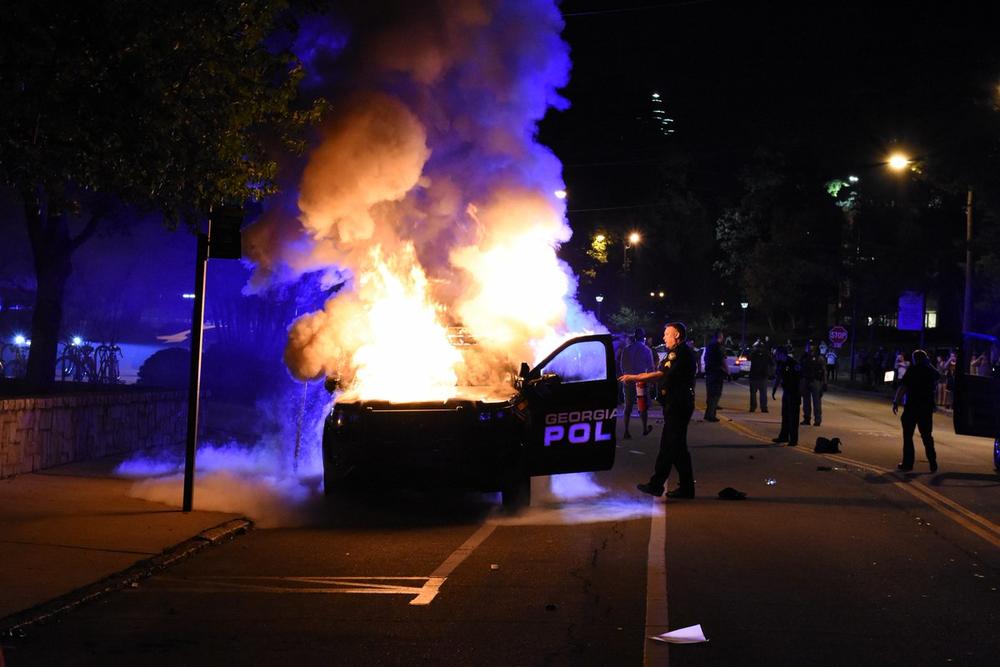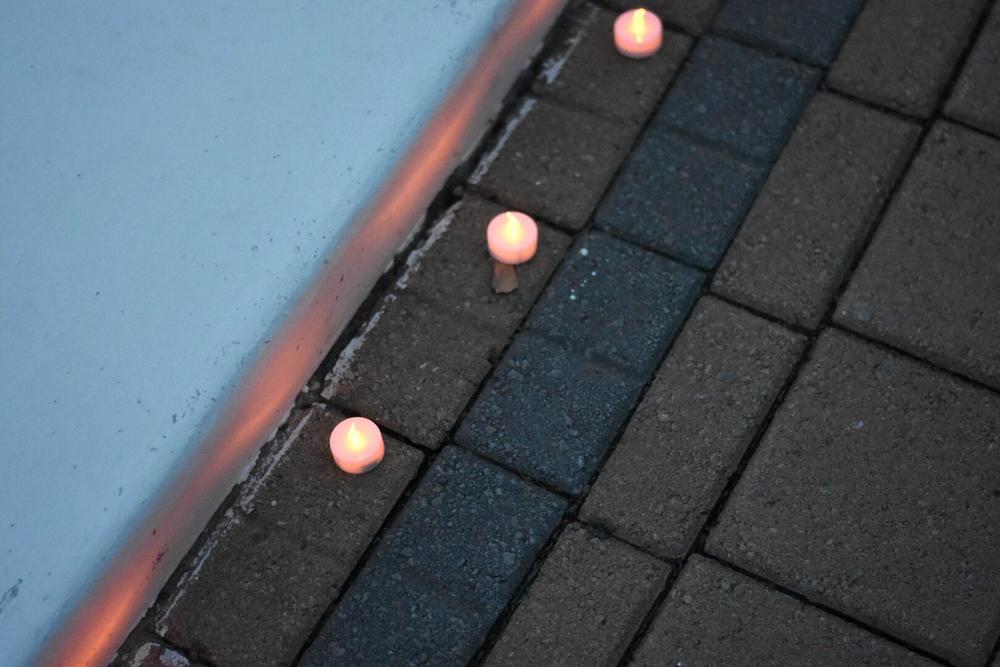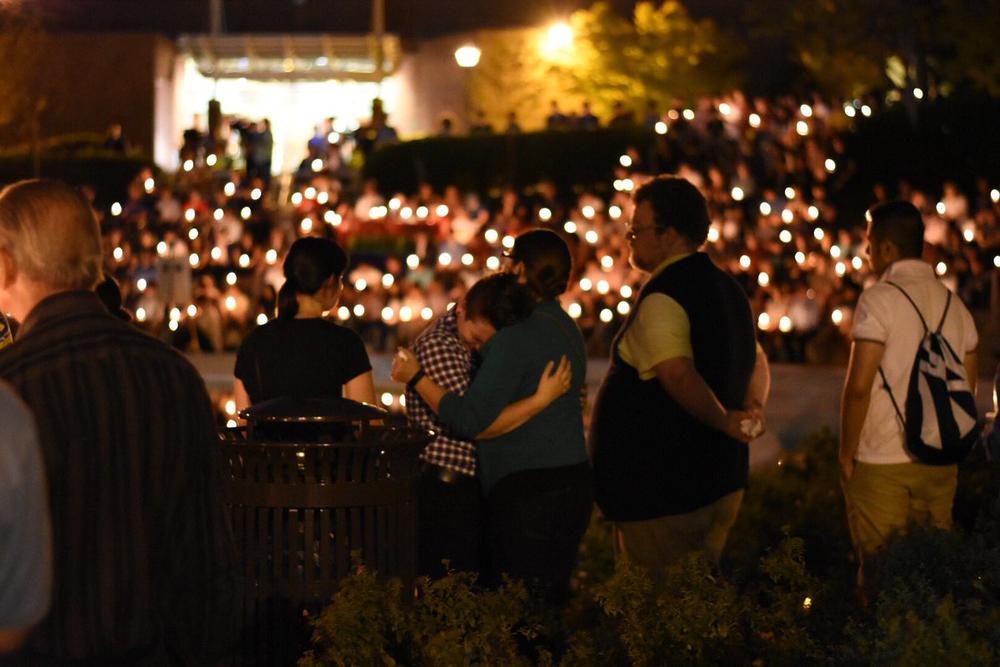Section Branding
Header Content
'It Was Surreal': Reporters On Violence After Georgia Tech Vigil
Primary Content
The Georgia Tech community is left with many questions after a student leader was fatally shot by campus police last weekend.
Scout Schultz was a fourth-year engineering student from Lilburn, Georgia, and president of Georgia Tech’s Pride Alliance.
Last Saturday evening, police say Schultz called 911 to report a person armed with a knife and potentially a gun.
School officials say Schultz then encountered campus police and ignored repeated commands to drop a multipurpose tool. Officer Tyler Beck, a 16-month veteran of the campus police force, fired a single shot, and Scout Schultz later died at the hospital.
On Monday, several hundred community members held a candlelight vigil for Schultz.
After the vigil, a smaller group of protesters marched through campus and clashed with Georgia Tech police. Three were arrested, two officers were injured, and a patrol car went up in flames.
GPB’s Maura Currie and Stephen Fowler were there, and they joined Rickey Bevington in the studio.
Rickey Bevington: Maura is a GPB news intern and a student at Georgia Tech. Maura, who was Scout Schultz?
Maura Currie: Scout Schultz was well known around campus as a member of the school’s activist community, particularly around LGBT+ issues.
Schultz identified as intersex, which means that they had chromosomes or anatomy that aren’t typically male or female. Though doctors assigned Schultz to the male gender after birth, Schultz was nonbinary and preferred to use gender-neutral pronouns, like “they” and “them” instead of “he” and him.”
This can be confusing to people who aren’t familiar with the terminology, and as a journalist can be difficult to express to people over the air. For the rest of this discussion, we’ll be using “they” and “them” when we refer to Scout Schultz.
At a news conference Monday morning, Schultz’s mother, Lynne Schultz, said her child had battled depression and that campus police should have been better equipped to diffuse the situation.
“They need to allow officers to carry Tasers and pepper spray,” Schultz said. “And they need to make sure everyone is well trained on how a person having a mental illness crisis is going to act.”
Currie: Since July of last year, students are allowed to carry Tasers on public college campuses in Georgia. But Georgia Tech’s police officers don’t carry Tasers. The department told students on Reddit about two months ago they were considering that option, but hadn’t yet implemented it by last weekend.
When the Georgia Tech officer shot Schultz, it was the first time one of the campus’s officers had ever fired a weapon in the field.
The officer that pulled the trigger, Tyler Beck, was hired last year and had not yet undergone crisis intervention training, which teaches law enforcement how to interact with people who may have mental illnesses.
Bevington: Tell me about the vigil for Schultz that was held a few days ago.
Currie: The vigil for Scout Schultz Monday night was at Georgia Tech’s campanile - it’s a landmark on the middle of campus. A normally-bubbling fountain was calm and smooth, reflecting both hundreds of candles and the midtown skyline.
Students who had been involved in Georgia Tech’s Pride Alliance remembered their former president as tenacious and passionate.
The Director of Tech’s LGBTQIA+ Resource Center, Aby Parsons, talked about Schultz’s impact on the community, and how Georgia Tech can move forward from this loss. As she spoke, she used Schultz’s preferred “they” pronouns.
“Scout’s legacy must be that we continue their work, that we don’t shy away from the ugly and messy work that we have to do in our communities, starting right here at Georgia Tech," Parsons said. "Their legacy must be that we never let fear or apathy prevent us from creating a world in which everyone is free. And their legacy must be that we commit to doing everything we can to let our queer and trans family know that they matter and that they belong here.”
And at the end of the vigil, a choir of students sang an a capella cover of “I’ll Be There” by the Jackson 5.
Bevington: So, what happened after the vigil ended? Did people stick around, or were people leaving? What was the feeling like?
Currie: The mood was somber but peaceful. The moment of silence in Schultz’s was long and broken only by the sounds of distant traffic and crickets.
Very few people left when the vigil had technically ended because there was a natural stillness to that moment.
I talked to Ryder McEntyre, a nonbinary person like Scout and a graduate of Berry College in North Georgia. They reflected on the pressures that genderqueer students face, both academically and in asserting their identity.
“College isn’t easy, and then you add being trans on top of that, it’s… I mean, just the ‘trans’, that’s enough to be suffering and to be in need of help, and then you expose those people to institutional violence that … and it’s just … it’s ridiculous," McEntyre said.
That was the pervasive feeling right after the vigil: frustration and sadness, but a desire to be constructive.
And this is the point the mood started to change: A distraught Tech student got up after a few minutes and started talking about what Scout would have wanted. Others chimed in. They were frustrated with the police, with Tech’s mental health services, with the media. I was heckled fairly aggressively on my own campus, which was a bizarre moment for me.
Then more people started screaming, cursing, and beginning to incite violence.
The atmosphere changed, and a smaller group of people started to assemble near the stage.
Bevington: Stephen, at this point, you and Maura were together by the fountain. What happened at this point?
Stephen Fowler: Maura and I were standing there together, listening to community members as they talked and the separate group was starting to assemble. They unfurled banners and banged drums, shouting and chanting. While Maura continued talking to people who attended the vigil, I set off across campus with that group of about 50 people, some wearing masks, all of them emboldened in their chants of “cops, pigs, murderers.”
Bevington: Who were these people, and what did they want to accomplish? Were they affiliated with the vigil?
Fowler: There’s no way of knowing everything about every person who was there. From what I saw, a good majority of the people that marched through campus were wearing masks, were not there for the bulk of the vigil, and did not appear to be affiliated with Georgia Tech.
Some lit flares, some brought drums. They took off through campus, blocking streets and continuing chants that were anti-police and pro-LGBT rights. Several times, they set off smaller fireworks.
The Georgia Tech police had a minimal presence, clearing the streets ahead of the protesters. Some of the masked people appeared to be affiliated with the Antifa, or anti-fascist movement that’s been active around the country.
The loosely-organized group has a belief in actively opposing racists, white supremacists, neo-Nazis, and, well, fascists using aggressive, and sometimes violent, tactics.
Bevington: Tell me more about that - the violent conflict between the protesters and police. Videos on social media show a very different scene than the candlelight vigil earlier in the night.
Fowler: Things escalated very quickly.
One minute, I was taking pictures of the group marching down Hemphill Avenue in the heart of campus. The next, someone jumped on top of a police cruiser, someone else started hitting Tech police officers, and a smoke grenade was thrown at me by someone in the crowd of protesters.
To top things off, someone threw a flare inside of a police cruiser and set it on fire.
This all happened about an hour and a half after the peaceful vigil started and the contrast could not be more stark.
The night started as a sea of candles reflecting off the Campanile fountain and ended with the bright orange glow of a burned-out patrol car.
Currie: About the same time Stephen was seeing the burning car, the whole campus received a shelter-in-place message from our emergency notification system, GTENS.
This was surreal for me, because it was the second time in three days we’d been ordered to shelter in place; the first being Saturday night, during the police altercation with Schultz. It’s so rare for that to happen, and students generally feel very safe on our campus, so it was a scary and confusing time for a lot of people.
Bevington: As a journalist who was there covering the event, but also as a Georgia Tech student, Maura, what is the reaction and response from the community?
Currie: Well, the reaction from students has been heartening, especially since Monday. Before the car was even extinguished, Tech students created an event online, volunteering to clean up campus the next morning. There’s been an outpouring of support for GTPD and a swift condemnation of the violent group from President Bud Peterson, who sent a campus-wide email after the incidents took place.
The Counseling Center is extending their hours and making themselves more available to students. There’s been a lot of positive chalk art on the sidewalks, and a movement to reclaim our campus, so to speak.
The LGBT+ community at Tech needs time to heal, obviously, and I hope they get the respect and space to do so. But I also hope we can use this time to have honest discussions with Tech’s administration and the rest of the country about issues like policing and mental health.
Bevington: You just used a very powerful term, “reclaiming our campus.” Can you sort of tease that out and discuss why students feel like they need to reclaim the campus?
Currie: Absolutely. Students knew almost immediately that this group wasn’t just fellow students who were upset. We’re all upset. There are jokes about Tech students being too busy to protest; we’re certainly not politically active to the extent of a place like Berkeley, but we’re also not at all destructive or violent. This felt like a definite intrusion, and there’s absolutely a desire on students’ part to reiterate what we as a campus really stand for.
Bevington: So, Stephen, what’s next?
Fowler: Well, the three protesters arrested appeared in court today. Two were charged with aggravated assault on an officer, and the Georgia Tech student was charged with inciting to riot and interfering with government property. A judge set bond for the trio.
Officer Beck, who fired the shot, is on leave while the Georgia Bureau of Investigation finishes up their inquiry.
And Georgia Tech students are beginning to return to normalcy.





